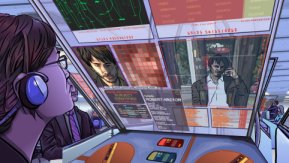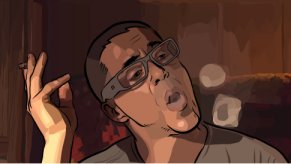|
A
Scanner Darkly
It's no accident in A Scanner Darkly
that this supposed futuristic repressive society looks pretty
much like our own. The things author Philip K. Dick predicted
(some might say "ranted about") have turned out to be pretty
much on target. Can you believe a country gripped by a war
on drugs, fought by people that are on drugs themselves?
Once upon a time that seemed like leftist paranoia.
And so the future is here. I really wish
we at least had personal jetpacks.
In order to give A Scanner Darkly
an air of unreality, writer/director Richard Linklater had
to turn to animation over his actors. But even that doesn't
serve the purpose of giving us distance. Instead, it draws
us deep into the experience of the characters, most of whom
are addicted to "Substance D." If they can't trust what
they're seeing, then we're not going to be allowed to trust
it, either.
Deepest in the distrust, not even the police
know who they are. Literally. They walk around in "scramble
suits," coverall and hood combinations programmed with the
constantly rotating features of over three thousand different
people. A character introduces undercover cop Bob Arctor
(Keanu Reeves) as being difficult to see, but for the audience,
it's not seeing - it's focusing that's the problem.
Of course, putting Reeves underneath the
scramble suit only heightens that sensation. Even if he
weren't secretly addicted to Substance D himself, Arctor
would have trouble focusing. None of his co-workers know
who he actually is, and his so-called friends are all people
that he will have to betray. Worse, one of them, James Barris
(Robert Downey, Jr.) has been actively trying to turn Arctor
in to …himself.
Par for the course for Philip K. Dick's
obsessions, but it all makes chilling sense in this film.
Other directors have made cool movies out of the author's
work (Blade Runner, arguably Minority Report),
but none have really captured the sensibility as well as
Linklater.
Keeping to a relatively small scale, the
director builds the paranoia. We get evidence of observational
cameras all over the place, blatant but so prevalent everyone
seems to ignore them. A protestor claims they're living
in a repressive society, and is quietly whisked away outside
a fast food restaurant. Though a title card claims this
is "seven years from now," except for the scramble suits,
there's nothing in the design of the film to separate it.
Even our first glimpse of this "reality"
is steeped in paranoia. Addict Charles Freck (Rory Cochrane)
awakens to find himself covered in bugs. No amount of showering
will get him or his dog clean. Driving to meet Barris, Freck
has a wild run-in with the police…or does he?
By the time we get to Arctor, he's a mess.
Due to his time on the streets, he has the clearest picture
of this war on drugs, and that's not saying much. Once upon
a time he might have had a family, but even that is suspect
memory. Then there's the problem of Barris' passive-aggressive
homicidal tendencies.
This is one of those rare films where Reeves'
too-common disconnectedness really works. He finds levels,
and unlocks a couple of moments where Arctor might even
dare feel comfortable, when out with possible dealer Donna
Hawthorne (Winona Ryder).
Even though every actor seems just about
note perfect, especially Downey and Woody Harrelson, A
Scanner Darkly isn't about the performances. It's about
the feeling - a creeping, dread feeling that Linklater imbues
the whole film with.
Along
the way, he makes some interesting points, no doubt working
from Dick's original text. If you're tired of loud explosions
or pointless wastes of time and want your interesting visuals
to make you think, A Scanner Darkly is a pretty good
way to spend your time. Rating: 
|








